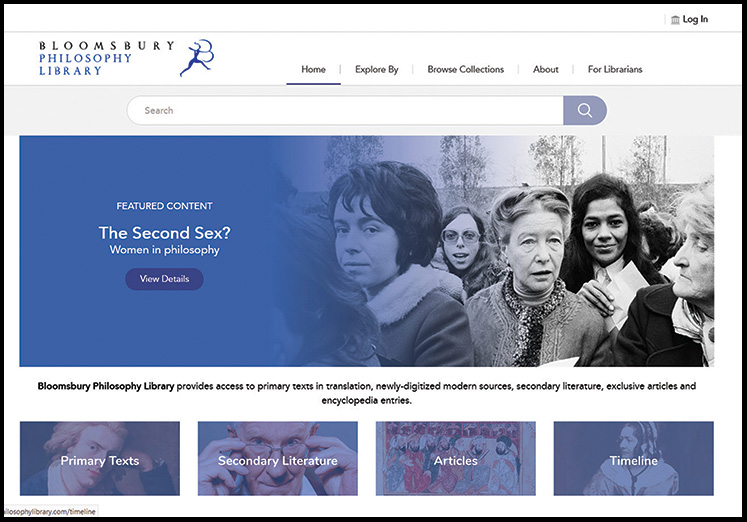Bloomsbury Philosophy Library | Reference eReview
A still-growing collection of 17th-, 18th-, 19th-, and 20th-century philosophy texts, plus a 6,500-entry Encyclopedia of Philosophers. It’s a viable resource for students, teachers, and researchers of philosophy, particularly Western philosophy, thanks to its easy navigation, multiple ways to access content, and numerous search features.
Bloomsbury Philosophy Library
CONTENT
Aimed at undergraduate and graduate students, faculty, and researchers, Bloomsbury Philosophy Library comprises three collections. Bloomsbury History of Modern Aesthetics consists of 20 hard-to-find 18th-, 19th-, and 20th-century texts. Bloomsbury 20th-Century French Thought offers 25 primary texts from late 20th-century French philosophers and 125-plus works of secondary literature. The Encyclopedia of Philosophers offers 6,500 articles covering the life and work of prominent philosophers from North America, Britain, Germany, Ireland, France, and the Middle East, from the 17th to 20th centuries.
New multi-content collections (Contemporary Aesthetics, Asian Philosophy, Radical Thought, Women Philosophers) are under development.
USABILITY
The platform is user-friendly, with an engaging interface, resourceful indexing, excellent searching tools, and attractive graphics. At the top of the landing page are tabs labeled “home,” “explore by,” “browse collections,” “about,” and “for librarians.” A basic search bar is below the main navigation, with an advanced search link next to it. Below the search bar, a box labeled “featured content” spotlights relevant material (for instance, an article on women in philosophy). Underneath, there are four boxes that let users search by primary texts, secondary literature, articles, and a time line. Scrolling down further, users will see three boxes devoted to each of the main collections in the database, as well as a “teaching and learning tools” box.
Clicking “explore by” allows users to search by subject, movements and schools of thought, person, period, and content type (articles, time lines, primary texts, secondary literature). “Browse collections” lets users access the three content collections.
Response time to queries is fast, with results arranged by relevance. Retrieved items can be sorted by ascending or descending order and title or date. They can be further refined by subject, movements and schools of thought, person, period, place, primary text, and content type. Using advanced search, researchers can narrow results by title, author/editor/creator, summary/abstract, category, or identifier and by article, bibliographic guide, biographical entry, image, or ebook. Boolean searching is also available.
Users can create personal accounts to save and organize content. Retrieved information can be saved, printed, shared, and cited in APA, MLA, and Chicago styles.
PRICING
Bloomsbury Philosophy Library is a multicollection digital research hub available via subscription or perpetual access. Collections are available via subscription ($898 to $7,240) or perpetual access ($5,386 to $43,443) with annual content update fees of $600 to $1,000 per collection for perpetual access customers. Content updates are included in the subscription price. Pricing is based on institution size and type; consortia discounts may apply.
VERDICT
Easy navigation, multiple ways to access content, and numerous search features characterize the archive. It is a viable resource for students, teachers, and researchers of philosophy, particularly Western philosophy. Librarians and users may want to compare it to the Routledge Encyclopedia of Philosophy Online, another excellent entry point for topics on philosophy. In sum, this is a strong product that will continue to improve as more content and resources are added.
Rob Tench is a Librarian at Old Dominion University Libraries, Norfolk, VA.
RELATED
ALREADY A SUBSCRIBER? LOG IN
We are currently offering this content for free. Sign up now to activate your personal profile, where you can save articles for future viewing










Add Comment :-
Comment Policy:
Comment should not be empty !!!